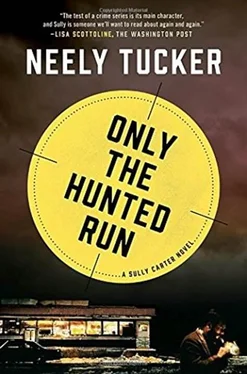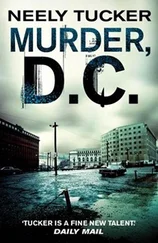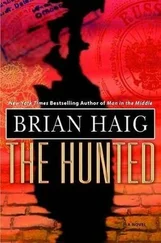“Good God,” Sully said.
“But look here-she ain’t dead yet. Sheriff shoots the lock out, bang, door bounces, all that brings her back to. She, swear to Christ, opens her eyes at the sheriff, sort of waves the knife around in a little circle, but she can’t raise it up. And then-this is the goddamndest thing-she pulls her right hand off her throat and pulls her dress back down below her knees. It had gotten pushed up, what with all the thrashing, I reckon, and it was high up on her hips. So she pulled it back down. That’s what was on her mind. Her knees. She didn’t want the sheriff to see her knees. ’Course, she pulled her hand away from her throat? All this blood comes gushing. She makes this weird little noise, like she’s gargling, waves that knife around in a little circle at the sheriff, like, go away. So he comes over, real careful like, and gets the knife away from her, then, there ain’t a towel or nothing, so he takes off his shirt real quick, whips off his T-shirt and gets that placed up against her neck. Pulls his shirt halfway back on, grabs her up, trying to keep her head from lolling back, and carries her out to the car, drives like hell for the hospital. She died on the way. DOA.”
Sully looked at him. The day had gone hot, stifling, airless. Sweat poured down him. He felt it mass on his stomach, pool in his crotch.
“The thing of it all was,” the deputy said, with another brown jet of juice, “that’s not the hell of it. The hell of it was the boy.”
“The grandson?”
“Yeah. See, the ambulance had never gotten out there by then, and the sheriff, he had to decide whether to leave the boy by hisself or bring him. A helluva thing either way. But he lays Missus Harper in the backseat, stands back, and there’s the boy, standing there with the butcher knife. Sheriff said he damn near jumped outta his skin. ‘I thought you might need this,’ the boy says. Holds it out. Just covered in blood. Well, good God, the sheriff gets it away from him. The boy commences to caterwauling and jumps in the backseat with his grandma before the sheriff can stop him and he’s all but laying on top of her, screaming ‘Granny, Granny,’ and the sheriff, he ain’t got the time, he just slams the door and takes off. Boy sat in the backseat, blood everywhere, laying up against his grandma, holding her hand, the sheriff hollering into the radio, the whole entire way. It was a helluva thing. Helluva thing.”
“You don’t remember the boy’s name,” Sully asked, all but holding his breath, closing his eyes against the heat. “By any chance.”
“I do. George. Sheriff said he had to keep hollering, ‘George, is she with us? George, is she with us?’ the whole way to the hospital. It was something stuck in his mind ever after that.”
OF COURSE THEREwas no cell coverage. None. He was driving north on the gravel road just up from the house, barely moving, holding the phone outside the window, upside down, sideways. He even stopped, making sure the deputy hadn’t doubled back from the highway to follow him, and stood on top of the rental, holding the phone as high as he could. Not a single bar.
“Piece of shit,” he said. He looked around from his car-top perch. Nothing. Just a few trees in the distance, dying of loneliness.
Susan in News Research, that’s who he needed. Someone with her skills digging through the computerized databases, LexisNexis, Accurint, Accutrack, tracking down Tex-Oil, Willliam Harper and his grandson George, the family or business in Texas. People didn’t walk off the face of the Earth. They left traces, fingerprints, property, financial transactions. What had Faulkner called it? A scratch mark on the face of oblivion?
Somewhere out there, Harper’s family had left their scratch mark. Somewhere out there, there was some record, some document, somebody, that could tell him what happened to the boy in the back of the car. Somewhere out there, there was something that would confirm in print what he already knew to the deep recesses of his marrow: George in the back of the sheriff’s car was the killer on Capitol Hill.
The problem was finding those traces, his mind spinning, stuck out here, nowheresville, on a gravel road, in the place where they strung up coyotes by their feet. Who would have pieces of them, where? He was looking for people who had left here twenty-five, nearly thirty years ago. What time was it…? Coming up on two. That gave him three hours till the county offices closed at five, and he was a good twenty or thirty minutes away. The schools, that would be good. Maybe young George had gone to school for a year or two up here. The land records for who owned it now. Didn’t the deputy say something about an absentee landlord? Christ, why hadn’t he thought to ask him that while he was standing there?
In the car, he put his foot to the floor and the rear end spun, fishtailing until he got it straightened out. Muttering under his breath now, “C’mon, c’mon.”
The next driveway turned out to be a mile up the road. He pulled in, a trailer on blocks and a dog in the yard. One truck parked beside it. Clothes on the line, a barn thirty yards behind the trailer but no livestock to be seen. The dog, a country mutt, was loud but not fierce. “Hey dog,” Sully said, loping out of the car, walking to the wooden steps leading to the door. The dog, following, head lowered, sniffing, but he wasn’t growling.
“Helllooo,” Sully called out, then rapped on the door gently. “Not a salesman, just a reporter.” He stepped back and leaned against the railing, holding his notebook in one hand, a pen in the other, as nonthreatening a stance as he could manage. He looked down at his shoes, in case anyone was eyeing him through the door, so that they couldn’t see his scars right away. No cars came by. There was no sound from inside. He was broiling, wide swatches of sweat dampening his light blue shirt, turning it navy in irregular blots. Rapping again, five knocks this time, he fished his press ID out of his pocket and slung the lanyard around his neck, letting the badge dangle. It couldn’t hurt. You wanted people to think you were a reporter nebbish, look like one.
He was halfway back to the car, holding his shirt by the top button, flapping it away from his chest, when he heard the door open behind him. A woman, wearing a pale T-shirt and brown yoga pants, bed head, her eyes puffy, looked out through the narrow opening. The dog went beside her into the house. She looked out, not saying anything, yawning. Sully, staying put, introduced himself, said he was just looking for anyone who might know the Harpers, who had lived next door a long time ago.
The woman pinched the bridge between her eyes, then sneezed. It made her hair flop over her forehead. “We ain’t been living here but two years,” she said.
“The people who had it before you, they-”
“They went off to Florida.”
“Okay. Any other neighbors what might be long timers?”
She just shook her head, brushing the brown hair back from her eyes, now holding a palm flat out from her forehead, a temporary visor from the sun.
“And ma’am, just in case there might be an owner who’s been around awhile, do you own this land out here, or do y’all rent?”
“Own,” she said. “Two years now. Thank you.”
She latched the screen door before closing the other. Even in the yard, Sully could hear the bolt turn.
When he got into town, things didn’t get any better.
Jo-Ellen had left for the day, and the lady at the clerk’s office, about fifteen minutes from retirement, harrumphed and hawed and heaved out a records book or two and confirmed the place had gone into probate, been divided up and sold off by the county in chunks. A man named Mitchell, Ross Mitchell, in San Francisco, he owned the Harper house and surrounding five acres. He’d been buying up derelict property around the county for ages, nobody really knew why. He paid the taxes by check and that was all he had to do, so. There wasn’t a phone number for him. She closed the book and looked at Sully.
Читать дальше








![Джон Макдональд - The Hunted [Short Story]](/books/433679/dzhon-makdonald-the-hunted-short-story-thumb.webp)



